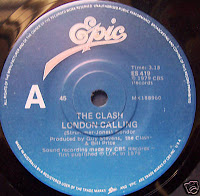



A place where you can see all those old vinyl record labels.


 Reprise was formed in 1960 by Frank Sinatra in order to allow more artistic freedom for his own recordings. He had earlier been with Capitol Records, but was upset when Capitol issued an album, Come Fly with Me, whose cover had a picture of him in front of an airplane with a Trans-World Airlines (TWA) logo. He believed Capitol and TWA were profiting together from his image, and left him out.
Reprise was formed in 1960 by Frank Sinatra in order to allow more artistic freedom for his own recordings. He had earlier been with Capitol Records, but was upset when Capitol issued an album, Come Fly with Me, whose cover had a picture of him in front of an airplane with a Trans-World Airlines (TWA) logo. He believed Capitol and TWA were profiting together from his image, and left him out. Reprise's artists included Sinatra's longtime friend Dean Martin, who was a singer and comedian, with a popular television show. Sinatra's daughter,Nancy Sinatra, became a recording artist and singer, and signed with her father's label. (His advice to her, whoever she signed with, was to "Own your own masters", and she did that. Years later, her catalog was valuable, and she earned more money from her records than if she was not their owner.) Reprise also released records by Jimi Hendrix, and later Neil Young.



 Sutherland and Luciano Pavarotti made many, if not all, of their recordings for the company.
Sutherland and Luciano Pavarotti made many, if not all, of their recordings for the company.


 Isla
Isla nd Records was founded in Jamaica in 1959 by Chris Blackwell and Graeme Goodall, taking its name from the 1955 Alec Waugh novel, subsequent film and Harry Belafonte hit song 'Island in the Sun'.
nd Records was founded in Jamaica in 1959 by Chris Blackwell and Graeme Goodall, taking its name from the 1955 Alec Waugh novel, subsequent film and Harry Belafonte hit song 'Island in the Sun'. y 1962. Until Blackwell sold the label to PolyGram in 1989, Island was the largest indie record label in history.
y 1962. Until Blackwell sold the label to PolyGram in 1989, Island was the largest indie record label in history.


 The Electric and Musical Industries Ltd formed in March 1931 from the merger of the UK Columbia Graphophone Company and the Gramophone Company, famous at the time for its record label "His Master's Voice".
The Electric and Musical Industries Ltd formed in March 1931 from the merger of the UK Columbia Graphophone Company and the Gramophone Company, famous at the time for its record label "His Master's Voice".EMI released its first LPs in 1952 and its first stereophonic recordings in 1955 (first on reel-to-reel tape and then LPs, beginning in 1958).
In 1957, to replace the loss of its long-established licensing arrangements with RCA Victor and Columbia Records (Columbia USA cut its ties with EMI in 1951), EMI entered the American market by acquiring 96% of the stock of Capitol Records.
From 1960 to 1995 their headquarters, "EMI House," was at 20 Manchester Square. The stairwell is on the cover of the Beatles' "Please Please Me" album.










 Capitol Records is a major United States-based record label owned by EMI and located in Hollywood, California and New York City as part of Capitol Music Group. Capitol's parent EMI is one of the "big four" music companies, the others being Universal Music, Sony BMG and Warner Music. Its former headquarters building, the Capitol Tower, is a major landmark near the corner of Hollywood and Vine. Among the more famous artists who have recorded for Capitol Records are Richard Marx, Tina Turner, Nat King Cole, Megadeth, Peggy Lee, Dean Martin, Frank Sinatra, Judy Garland, The Beach Boys, The Beatles, Pink Floyd, Duran Duran, Kylie Minogue, the Beastie Boys, Coldplay, Oasis and Radiohead.
Capitol Records is a major United States-based record label owned by EMI and located in Hollywood, California and New York City as part of Capitol Music Group. Capitol's parent EMI is one of the "big four" music companies, the others being Universal Music, Sony BMG and Warner Music. Its former headquarters building, the Capitol Tower, is a major landmark near the corner of Hollywood and Vine. Among the more famous artists who have recorded for Capitol Records are Richard Marx, Tina Turner, Nat King Cole, Megadeth, Peggy Lee, Dean Martin, Frank Sinatra, Judy Garland, The Beach Boys, The Beatles, Pink Floyd, Duran Duran, Kylie Minogue, the Beastie Boys, Coldplay, Oasis and Radiohead.